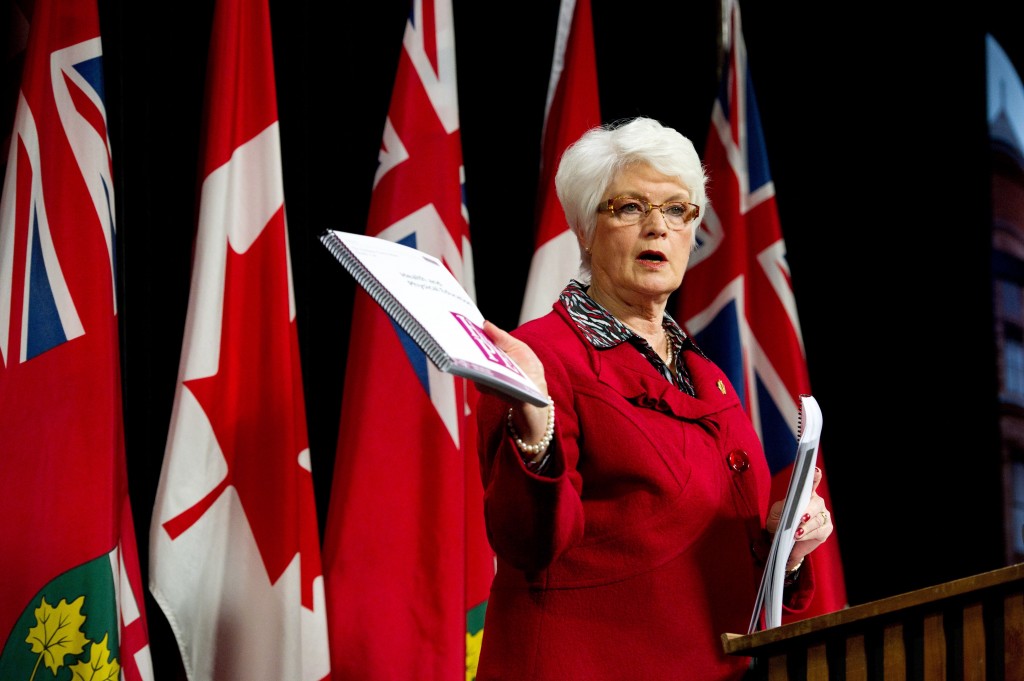Here’s the wildest fact about Ontario’s sex-ed curriculum
The most galling thing about Ontario’s current sex-ed curriculum bears repeating as opponents warm up the war machines
Ontario Education Minister Liz Sandals presents the revised Health and Physical Education curriculum at a press conference at Queen’s Park in Toronto, Monday, February 23, 2015. (Galit Rodan/The Canadian Press)
Share

For the unpronounceable symbol/funk musician Prince, writing the song 1999 deep in the neon recesses of the 1980s must have been like writing of an imaginary futuristic tomorrowland. The biggest fear of the time: nuclear proliferation. “Partying like it was 1999” sounded like a pretty good time, in a pretty cool year. “Don’t worry, I won’t hurt you / I only want you to have some fun,” he slithers as the track opens—presaging, perhaps hopefully, a looser-limbed, more Dionysian age.
1999 has come and gone, of course, and it wasn’t quite the bacchanalia Prince envisioned. It was more of a way-station year than anything else, before the onset of the new millennium and a decade of New Year’s novelty sunglasses that use the middle zeroes of the year as the lenses. But 1999 was also the year that Ontario’s most recent iteration of its sex-ed curriculum, formally created in 1998, came into effect—the most stunning, galling fact about what is set to consume Ontario’s legislature over the next few months. On Monday, Education Minister Liz Sandals officially unveiled an updated sex-ed curriculum that includes, among other things, teaching of consent at Grade 1 and of masturbating—gasp!—in Grade 6. According to the National Post, the old one waited until Grade 8 to explain, rather direly, the “consequences of engaging in sexual activities”; the old one did not mention the words “sexual orientation,” “homophobia” and “gender identity,” and efforts to merely add them to a glossary of terms for teachers—not even actually including in the curriculum—was spiked when efforts to reform it failed in 2011.
This will, invariably, launch some worthwhile discussions about the role of government in private parenting, where many feel the onus lies in sex education. There will be debates over the marginalization of religious beliefs in our schools. Already, there are social conservative factions spoiling for a fight: A rally is being organized against the new curriculum at Queen’s Park on Tuesday.
But here’s the thing people maybe aren’t quite understanding: The last time Canada’s most populous province had a new sex-ed curriculum was in 1999—making it the oldest one in Canada.
Here’s a short list of things we didn’t have in 1999: We didn’t have YouTube, or even the first iPod, much less Facebook and Twitter and other society-ruining future machines. In those 16 years, Segways went from the next big thing to the purview of the senile and the lazy. Getting onto a plane was a relative breeze. You couldn’t tap credit cards to make payments; heck, you couldn’t tap anything on your cellphone, other than arduously tapping out a text message—and, if you were lucky, you had the predictive functions of T9 texting, so that you didn’t have to just press the 5 button three times just to type the letter L. USB flash drives didn’t exist. In 1999, a significant chunk of us genuinely feared that computers were going to rain missiles down upon us on New Year’s Day. Never mind the fact that Snapchat and other social media wasn’t around, as Sandals noted—computers as we understand them to work today didn’t exist.
There’s no question that technology has zoomed ahead, and we’ve happily zoomed along with it. On the cellphones each of us has, we carry a cloud bank of personal data, a way to access our friends in seconds, and we have ready access to every song and video in the history of those media. We’ve accepted these vast, unhalting changes, modified our behaviours, and updated and upgraded and improved our lives in every way—except, apparently, in this fundamental, eminently crucial one: teaching our children about sex, an issue that has been here since time immemorial, even before 1999.
It’s not even simply the fact that we should match a digital world that has evolved well past us. It’s the sheer illogic of the fact that teaching—an essentially forward-facing practice—should remain frozen in time.
Ask any parents to sacrifice their own comfort for their children, and they wouldn’t bat an eyelash. But our discomfort has left our educational and legal systems without any of the answers—answers that adults are supposed to have. Why are we keeping them from our kids? So let’s keep getting uncomfortable—and, most of all, uncomfortable with the fact that 16 years is too long for change. Perhaps the anti-curriculum protesters will take a minute to truly chew on that.